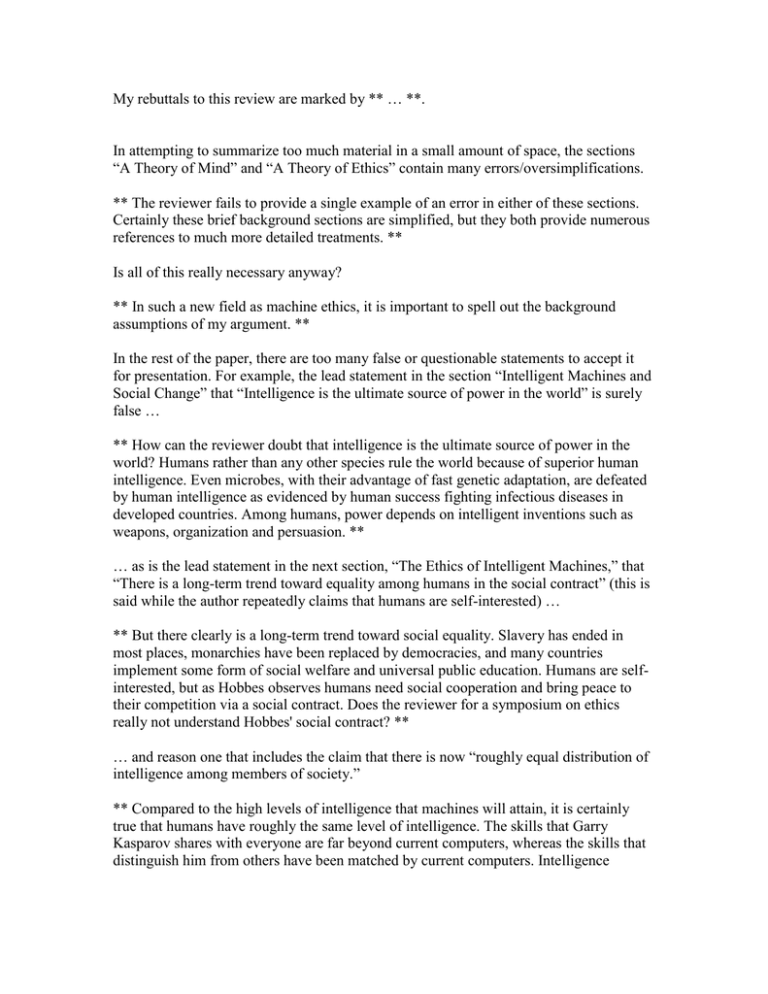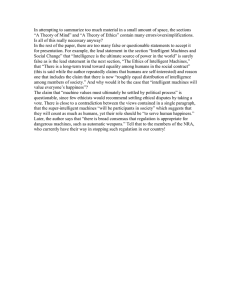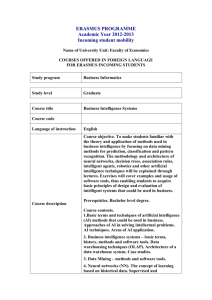My rebuttals to this review are marked by ** … **. In attempting to summarize too much material in a small...
advertisement

My rebuttals to this review are marked by ** … **. In attempting to summarize too much material in a small amount of space, the sections “A Theory of Mind” and “A Theory of Ethics” contain many errors/oversimplifications. ** The reviewer fails to provide a single example of an error in either of these sections. Certainly these brief background sections are simplified, but they both provide numerous references to much more detailed treatments. ** Is all of this really necessary anyway? ** In such a new field as machine ethics, it is important to spell out the background assumptions of my argument. ** In the rest of the paper, there are too many false or questionable statements to accept it for presentation. For example, the lead statement in the section “Intelligent Machines and Social Change” that “Intelligence is the ultimate source of power in the world” is surely false … ** How can the reviewer doubt that intelligence is the ultimate source of power in the world? Humans rather than any other species rule the world because of superior human intelligence. Even microbes, with their advantage of fast genetic adaptation, are defeated by human intelligence as evidenced by human success fighting infectious diseases in developed countries. Among humans, power depends on intelligent inventions such as weapons, organization and persuasion. ** … as is the lead statement in the next section, “The Ethics of Intelligent Machines,” that “There is a long-term trend toward equality among humans in the social contract” (this is said while the author repeatedly claims that humans are self-interested) … ** But there clearly is a long-term trend toward social equality. Slavery has ended in most places, monarchies have been replaced by democracies, and many countries implement some form of social welfare and universal public education. Humans are selfinterested, but as Hobbes observes humans need social cooperation and bring peace to their competition via a social contract. Does the reviewer for a symposium on ethics really not understand Hobbes' social contract? ** … and reason one that includes the claim that there is now “roughly equal distribution of intelligence among members of society.” ** Compared to the high levels of intelligence that machines will attain, it is certainly true that humans have roughly the same level of intelligence. The skills that Garry Kasparov shares with everyone are far beyond current computers, whereas the skills that distinguish him from others have been matched by current computers. Intelligence differences among humans are mostly at the margins. In is an unjustified conceit among some educated people to confuse lack of education with lack of intelligence. ** And why would it be the case that “intelligent machines will value everyone’s happiness”? ** My paper is very clear that intelligent machines valuing everyone’s happiness is a prescription rather than a prediction of an inevitable result. My claim is that it is an ethical imperative that we design intelligent machines to value happiness of all humans. ** The claim that “machine values must ultimately be settled by political process” is questionable, since few ethicists would recommend settling ethical disputes by taking a vote. ** On the contrary, most ethicists in democracies support democracy and understand that high stakes ethical issues are settled politically. The role of ethicists is to help inform the political process on the issues. ** There is close to a contradiction between the views contained in a single paragraph, that the super-intelligent machines “will be participants in society” which suggests that they will count as much as humans, yet their role should be “to serve human happiness.” ** How is this a contradiction? My paper does not say machines will be equal participants in society, and in fact argues against that. But they will be able to converse with humans in natural language and hence will participate in society. ** Later, the author says that “there is broad consensus that regulation is appropriate for dangerous machines, such as automatic weapons.” Tell that to the members of the NRA, who currently have their way in stopping such regulation in our country! ** Automatic weapons are regulated in the US. In fact, they are highly illegal, with long prison sentences for anyone caught selling them. Perhaps the reviewer has confused automatic weapons with semi-automatic weapons? By bringing up the NRA the reviewer is providing a good example of an ethical issue, gun control, that is settled politically. This contradicts the reviewer’s previous assertion that ethical issues are not settled politically. **




